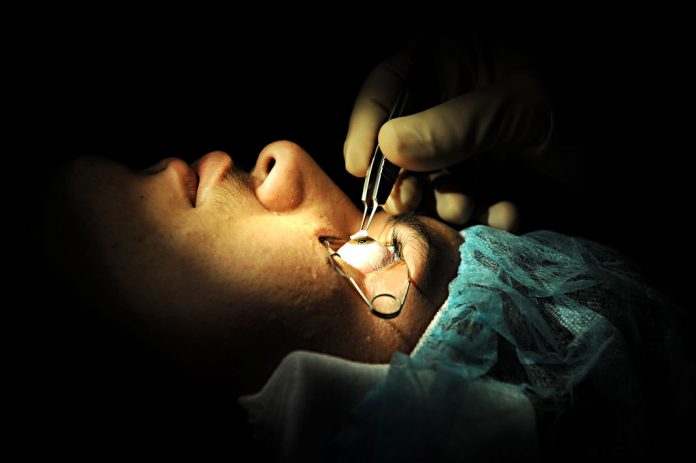
San Juan Bautista teenager Jose Pineda wants to become a Marine, but he has an eye condition that, without correction, would make this dream impossible.
Pineda, 14, has keratoconus, a hereditary condition in which his eye’s normally rounded cornea thins, resulting in a cornea bulge and the progressive loss of vision. Through the San Jose-based Furlong Vision Correction’s Gift of Sight, a free vision correction program for underprivileged individuals, Pineda received a treatment Nov. 21 that stabilized the condition in his left eye and means he can avoid a corneal transplant later in life.
“Right now keratoconus can disqualify somebody from entering into the armed forces,” said Dr. Michael Furlong, the medical director of Furlong Vision Correction. “There’s different criteria – different positions, of course.”
Possible military service is still a long time away for Pineda, an eighth grader at San Juan School who likes his history class. Without glasses, Pineda has to squint at the board to read assignments even when he is sitting at the front of the room. He’s been wearing hard contacts for months to correct the shape of his cornea. This procedure will mean he can wear soft contacts, which are more comfortable.
“Fortunately, we caught his condition with his vision pretty good,” Furlong said.
Pineda currently has vision in the 20/30 to 20/50 range, the doctor said. This means that without glasses, Pineda can sort of see the face of a person just a few feet away. Someone about 10 feet away is a blurry figure.
The condition affects about one in 2,000 people, Furlong said. The doctor started the Gift of Sight program about 12 years ago because he remembered seeing pro bono cataract surgeries during his residency, but didn’t know of a comparable program offering LASIK surgery, which uses lasers to correct the eye’s cornea and reduce or eliminate the need for glasses.
In 2011, some keratoconus work started developing. Furlong realized many patients with the degenerative eye disease didn’t have medical insurance so he expanded the Gift of Sight program.
Pineda is the youngest patient to go through the program. The particular procedure he received last Friday is typically $3,000 per eye or $6,000 total, Furlong said. More extensive surgeries including intact placement – which places implants into the thickest outer edge of the cornea in an effort to improve vision and defer a corneal transplant – can easily cost about twice that, Furlong said. Pineda is still too young to complete those procedures.
The current treatment is not yet U.S. Food and Drug Administration approved but has been used for about 15 years in Europe, Furlong said.
“When it does get approved it will become more accessible to patients and will be covered by insurance,” he said.
In the surgery suite
In the surgery suite, the doctor used a tiny sponge with medicine on it to make the cornea surface – which typically works to keep substances from entering the eye – more permeable. Then Pineda walked to a private room, climbed into a large, navy-blue, elevated chair and waited while Center Manager Felicia Parker patiently plopped single drops of transparent yellow liquid into his eye every minute for a half hour and tried to make small talk.
The drops were a liquid form of the vitamin riboflavin, which gets between the collagen molecules in the middle of the cornea and, when activated with ultraviolet light, causes crosslinking between the molecules that will make Pineda’s bulging cornea become more rounded, Furlong said.
On that day, Pineda would rather have been in school. It’s not that he particularly likes school. It’s more that he is scared of surgery.
“I want to go (to school) because I want to graduate,” Pineda said. “I didn’t want to do this because I’ve never had surgery before.”
An added complication to the event is that Pineda’s support structure – his parents – don’t speak much English. The family brought along Pineda’s cousin, Yadira Pineda, so she could translate the conversations into Spanish, but she didn’t say much during the more than two hours the family sat in the doctor’s office.
Pineda’s mother, Berenice Campos, 32, teared up, stared at the ceiling and fingered the strap of her purse during much of the time the family spent in the waiting room.
“For me it’s good to improve his vision, his eyes,” she said in Spanish, as she sat in the front lobby before the family was whisked into a back waiting room just steps away from the surgery suite.
For Campos, it’s an opportunity for her son to improve his eyesight so that school becomes easier.
Pineda can’t think of another person in the family who has keratoconus, though the center manager notes it is a hereditary condition. His mother has glaucoma, which refers to a group of diseases that damage the eye’s optic nerve and lead to gradually worsening vision.
Following the procedure, his eye will feel scratchy and irritated for three to five days as it adjusts, the doctor said. Pineda will be scheduled for a second appointment to perform the same procedure on his right eye soon, probably near his Christmas break so he will have a few days to recover without missing classes.
For now, the progression of the disease in his left eye has been stopped and he is a step closer to his dream of serving in the armed forces, though surgeries to help improve his vision might be needed in the future.
“Since your vision is stable at that point, it might open doors for him that might not be open with the regular diagnosis of keratoconus,” Furlong said.









